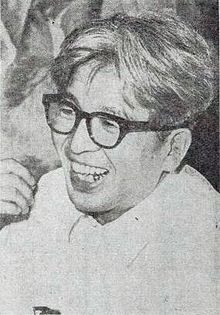Ryōtarō Shiba
This article needs additional citations for verification. (November 2013) |
Ryōtarō Shiba | |
|---|---|
 Ryōtarō Shiba in 1964 | |
| Born | August 7, 1923 Osaka, Japan |
| Died | February 12, 1996 (aged 72) Osaka, Japan |
| Occupation | Writer |
| Genre | historical novel, detective fiction |
Teiichi Fukuda (福田 定一, August 7, 1923 – February 12, 1996), also known as Ryōtarō Shiba (司馬 遼太郎), was a Japanese author. He is best known for his
Career
Shiba took his pen name from
Several of Shiba's works have been translated into English, including Drunk as a Lord: Samurai Stories (2001), his fictionalized biographies of
Ryōma Goes His Way
One of Shiba's best known works, Ryōma Goes His Way (竜馬がゆく, Ryōma ga Yuku), is a historical novel about
In Ryōma ga Yuku, Sakamoto Ryōma, the protagonist, starts out as a member of the Sonnō-Jōi faction but gradually realizes that people need to realize how much stronger other countries have grown during Japan's two centuries of national seclusion. Japan was almost powerless in the face of the technology and well-developed industry of the contemporary Western powers. He believed that Japan needed to adopt elements of Western culture to develop into a country that could stand equally among nations.
Sakamoto Ryōma was not well known in Japan prior to the publication of Ryōma ga Yuku.[4] Ryōma ga Yuku is Shiba's best selling work in Japanese, with 21,250,000 copies sold.
Kaidō wo Yuku
Kaidō wo Yuku (街道をゆく, "On the highways") is a series of travel essays initially published in Shūkan Asahi, a weekly magazine,[5] from 1971 until 1996. Shiba wrote the series with an intercultural perspective, making observations about the history, geography, and people of the places he visited. Though mostly about different areas of Japan, the series includes several volumes on foreign lands as well—China, Korea, the Namban countries (Spain and Portugal), Ireland, the Netherlands, Mongolia, Taiwan, and New York.
The work, now available in multi-volume book form, was also developed into documentary series and broadcast on
The series ran for 1,146 installments.[3]
Clouds Above the Hill
Another well-known work, Clouds Above the Hill (坂の上の雲,
Battles of Khalkhin Gol
Shiba began working on a novel based on the Battles of Khalkhin Gol and conducted research. However, as he delved deeper into his research, his motivation to write dwindled.
"I started hating being Japanese."
"I can't understand this country Japan, which engages in such foolish acts."
In the end, he gave up writing.[6]
Death
Shiba suffered internal bleeding and lapsed into a coma on February 10, 1996. He died two days later.[3]
Works
Novels
- Fukurō no Shiro (1959)
- Zeeroku Bushido (上方武士道, 1960)
- Kaze no Bushi (1961)
- Senun no yume (戦雲の夢, 1961)
- Fujin no mon (風神の門, 1962)
- Ryoma ga Yuku (竜馬がゆく, 1963–66)
- Moeyo Ken (1964)
- Shirikurae Magoichi (尻啖え孫市, 1964)
- Komyo ga tsuji (功名が辻, 1965)
- Shiro wo toru hanashi (城をとる話, 1965)
- Kunitori monogatari (国盗り物語, 1965)
- Yotte soro (酔って候, 1965), published in English as Drunk as a Lord
- Hokuto no hito (北斗の人, 1966)
- Niwaka Naniwa yukyoden (俄 浪華遊侠伝, 1966)
- Sekigahara (関ヶ原, 1966)
- Jūichibanme no shishi (十一番目の志士, 1967)
- Saigo no Shōgun (最後の将軍, 1967), translated into English as ISBN 1568363567) about Tokugawa Yoshinobu.
- Junshi (殉死, 1967)
- Natsukusa no fu (夏草の賦, 1968)
- Shinshi taikoki (新史太閤記, 1968)
- Yoshitsune (義経, 1968)
- Touge (峠, 1968)
- Musashi (武蔵, 1968)
- ISBN 1138911968), a work of historical fiction about the Russo-Japanese War.
- Yōkai (妖怪, 1969)
- Daitōzenshi (大盗禅師, 1969)
- Saigetsu (歳月, 1969)
- Yoni sumu hibi (世に棲む日日, 1971)
- Jousai (城塞, 1971–72)
- Kashin (花神, 1972)
- Haō no ie (覇王の家, 1973)
- Harimanada monogatari (播磨灘物語, 1975)
- Tobu ga gotoku (翔ぶが如く, 1975–76)
- Kūkai no fukei (空海の風景, 1975), translated into English as Kukai the Universal: Scenes from his Life (Shingon school and is said to have invented the Japanese kanawriting system.
- Kochō no yume (胡蝶の夢, 1979)
- Kouu to Ryūhō (項羽と劉邦, 1980)
- Hitobito no ashioto (ひとびとの跫音, 1981)
- Nanohana no oki (菜の花の沖, 1982)
- Hakone no saka (箱根の坂, 1984)
- Dattan shippuroku (韃靼疾風録, 1987), translated into English as The Tatar Whirlwind: A Novel of Seventeenth-Century East Asia (ISBN 1891640461), about the decline of the Ming dynasty, the rise of the Manchus and the interplay of these two periods in China's history with Tokugawa Japan.
Honours
- Naoki Prize (1960)
- Kikuchi Kan Prize (1966)
- Yomiuri Prize (1981)[7]
- Asahi Prize (1982)
- Person of Cultural Merit (1991)
- Order of Culture (1993)
- Junior Third Rank (1996, Posthumous)
See also
References
- ISBN 978-1-136-16224-4.
- ^ [1] and [2], reference text.
- ^ a b c d "Ryotaro Shiba, 72, Historical Novelist." The New York Times. Friday February 16, 1996. Retrieved on July 11, 2009.
- ISBN 0231101732.
- ^ Shukan Asahi Archived January 6, 2008, at the Wayback Machine, Asahi Shimbun
- ^ "司馬遼太郎が「日本人であることが嫌になった」と執筆を断念した戦争". NHK. Retrieved March 27, 2024.
- ^ "読売文学賞" [Yomiuri Prize for Literature] (in Japanese). Yomiuri Shimbun. Retrieved September 26, 2018.
External links
- Shiba Ryōtarō Memorial Museum
- Ryōtarō Shiba at IMDb
- Synopsis of Kukai the Universal: Scenes from His Life (Kukai no Fukei) at JLPP (Japanese Literature Publishing Project) (in English)
